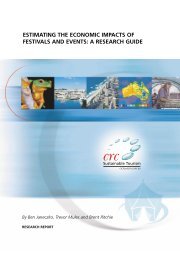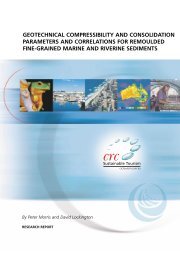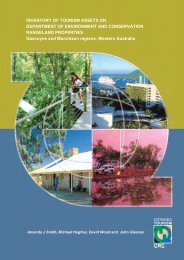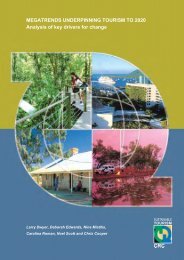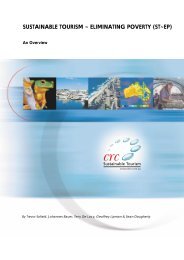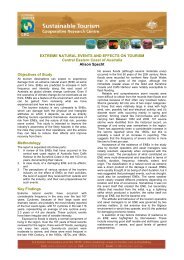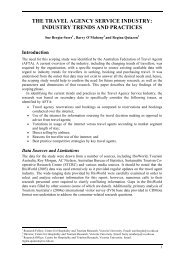icolls - Sustainable Tourism CRC
icolls - Sustainable Tourism CRC
icolls - Sustainable Tourism CRC
Create successful ePaper yourself
Turn your PDF publications into a flip-book with our unique Google optimized e-Paper software.
ECOLOGY, THREATS AND MANAGEMENT OPTIONS FOR SMALL ESTUARIES AND ICOLLS<br />
is required to assess the ecological impacts of artificial berm breaching, particularly given that these actions have<br />
the potential to influence fisheries production (Pollard et al. 1994b; Bell, Cowley & Whitfield 2001; Griffiths<br />
2001). Fish productivity is likely to be most affected by removal of spawning cues such as decreased salinity (a<br />
function of increased freshwater flows). In addition to these physico-chemical changes, the biotic consequences<br />
of forced opening of an ICOLL are likely to influence ecological structure and function of the system for an<br />
extended period of time beyond the initial opening event (Vander Zanden, Casselman & Rasmussen 1999;<br />
Josefson & Rasmussen 2000; Martins et al. 2001).<br />
Artificial opening of ICOLL mouths might also influence natural opening processes, particularly through<br />
changes to sediment and hydrological forces within the system (Cappo et al. 1998). Although there are no data to<br />
indicate whether the removal of the natural opening and closing regime is likely to disadvantage particular<br />
species, it is certainly likely that ICOLL ecology will be altered through the removal of rainfall-initiated berm<br />
breaches and their associated ecological processes.<br />
Ecologically sustainable management options with regard to ICOLL opening<br />
In light of the increasing developmental pressure within the coastal zone (Thomson 1975; Turner 2000; Zann<br />
2000; Bowen & Valiela 2001; Hamilton & Turner 2001; Roy et al. 2001; Struglia & Winter 2002), it is likely<br />
that artificial opening regimes will be applied with increasing frequency to ICOLLs within urban catchments.<br />
However, given the adverse ecological responses to artificial opening observed in many systems, it is suggested<br />
that ecologically sound artificial opening regimes may yield better social and ecological outcomes.<br />
With regard to flushing of ICOLLs (via artificial opening) to remove nutrients and/or excessive algal growth,<br />
improved catchment management strategies have the potential to reduce the need for such actions (Bohn &<br />
Kershner 2002; Nedwell, Sage & Underwood 2002; Valiela & Bowen 2002). For example, regeneration of<br />
riparian vegetation is likely to facilitate greater soil stability and reduced sediment load delivery to the ICOLLs<br />
(Nakamura, Swanson & Wondzell 2000; Nilsson & Svedmark 2002; Pusey & Arthington 2003). However,<br />
current trends towards increased urban development in coastal regions promise to ensure the delivery of<br />
excessive quantities of nutrients (Page, Petty & Meade 1995; Josefson & Rasmussen 2000; Bouillon, Raman,<br />
Dauby & Dehairs 2002; Tong & Chen 2002). Coupled with growing water allocation issues (Bunn & Arthington<br />
2002; Arthington & Pusey 2003), it seems likely that many ICOLLs are likely to suffer from insufficient<br />
delivery of freshwater flows as well as excessive nutrient inputs (Roy et al. 2001). Together, these factors could<br />
increase the propensity of ICOLLs to act as net nutrient sinks within the coastal zone (Cappo et al. 1998).<br />
Despite the need for these substantial changes to coastal zone management, none of these alternatives are<br />
likely to be economically feasible in the short term (Costanza et al. 1997). As a result, the ongoing artificial<br />
opening of ICOLLs should at least be practiced with some reference to the ecology of the systems and the<br />
implications of varying the timing and placement of berm breaches. In short, artificial opening should be<br />
restricted to times during which the fauna of ICOLLs is most resilient to changes (or most able to take advantage<br />
of the changes). Unfortunately, there is very little data to inform ecologically-timed opening of individual<br />
ICOLLs, each with idiosyncratic hydrodynamic characteristics. It is therefore likely that forced ICOLL openings<br />
are likely to continue to occur in an ad hoc reactive manner.<br />
Ecologically sustainable management of freshwater inflows to ICOLLS<br />
The maintenance of dynamic freshwater flows to estuaries and coastal lagoons is recognised as an integral<br />
component of environmental flow management in coastal catchments of Australia and other countries<br />
(Arthington & Zalucki 1998; Bunn, Loneragan & Yeates 1998; Kimmerer 2002; Montagna, Alber, Doering &<br />
Connor 2002; Dyson et al. 2003). The design and management of estuarine environmental flows has paralleled<br />
developments in freshwater systems (Peirson, Bishop, Van Senden, Horton & Adamantidis 2002; Arthington,<br />
Tharme, Brizga, Pusey & Kennard 2004) such that holistic, ecosystem approaches are increasingly employed<br />
(Adams, Bate, Harrison, Huizinga, Taljaard, van Niekerk, Plumstead, Whitifled & Wooldridge 2002; Alber<br />
2002), linking flow to water quality, habitat, movement and recruitment of biota, maintenance of food web<br />
structure, productivity and so forth (Estevez 2002). Recent investigations of environmental flows for rivers<br />
discharging to the sea have aimed to integrate freshwater and estuarine flow regimes for entire catchments (e.g.<br />
Brizga 2000; Bunn, Loneragan & Yeates 1998) following basic hydro-ecological principles (e.g. Bunn &<br />
Arthington 2002; Nilsson & Svedmark 2002) and the natural flow regime paradigm (Poff, Allan, Bain, Karr,<br />
Prestegaard, Richter, Sparks & Stromberg 1997; Lytle & Poff 2004). A desirable goal for the management of<br />
freshwater flows to ICOLLs would be the provision of a near-natural flow regime (i.e. a temporal sequence of<br />
freshwater inflows) linked to an entrance opening regime. Assessment of the flow and entrance opening<br />
requirements of ICOLLs is only just receiving attention in Australia as a component of ICOLL sustainability<br />
assessments (Healthy Rivers Commission 2001).<br />
10



